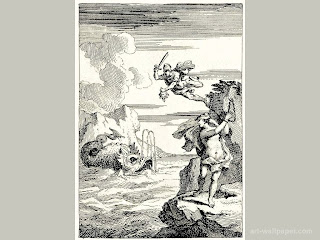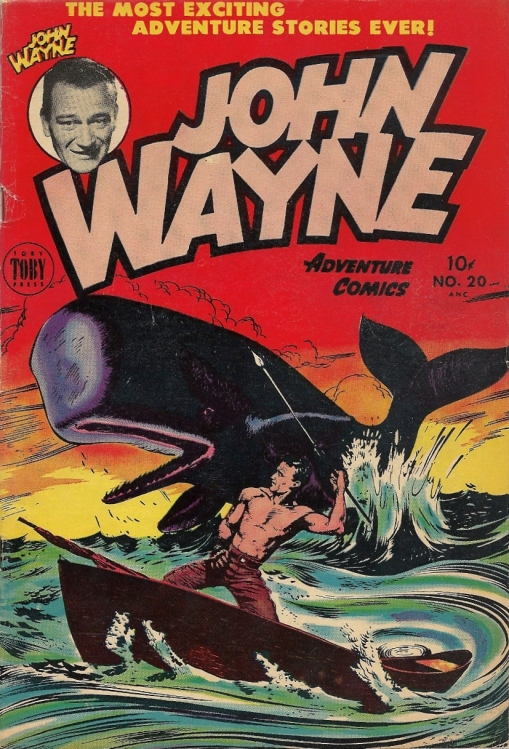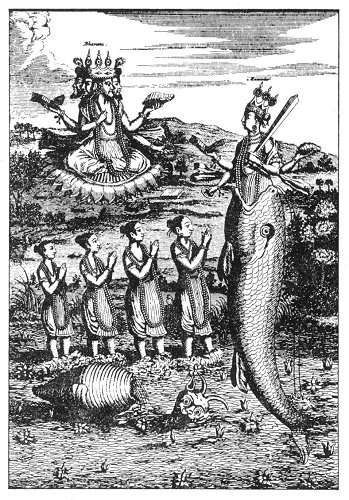CHAPTER 82. The Honour and Glory of Whaling.
Here Melville digresses into the mythology of whaling. I have found a few pictures to help illustrate.
http://ticklemebrahms.blogspot.com.au/2 ... chive.html gives this picture of the demigod Perseus flying in with his sword and winged sandals to save the beautiful Andromeda from the rising tide, and the fast encroaching whale, as she is chained to the rock.

The more I dive into this matter of whaling, and push my researches up to the very spring-head of it so much the more am I impressed with its great honourableness and antiquity; and especially when I find so many great demi-gods and heroes, prophets of all sorts, who one way or other have shed distinction upon it, I am transported with the reflection that I myself belong, though but subordinately, to so emblazoned a fraternity.
Whales do indeed have a mythological status, especially considering how in ancient times humans were so much less able to process them industrially with our modern tools of steel and oil. Here is what Melville has to say about Perseus.
Of course the 'best harpooners of the present day' lack the high technology of winged sandals, but they do have other equally powerful methods. Next we find Melville speculating on whether the famous dragon consigned to death by the patron saint of England was in fact a whale.The gallant Perseus, a son of Jupiter, was the first whaleman; and to the eternal honour of our calling be it said, that the first whale attacked by our brotherhood was not killed with any sordid intent. Those were the knightly days of our profession, when we only bore arms to succor the distressed, and not to fill men's lamp-feeders. Every one knows the fine story of Perseus and Andromeda; how the lovely Andromeda, the daughter of a king, was tied to a rock on the sea-coast, and as Leviathan was in the very act of carrying her off, Perseus, the prince of whalemen, intrepidly advancing, harpooned the monster, and delivered and married the maid. It was an admirable artistic exploit, rarely achieved by the best harpooneers of the present day; inasmuch as this Leviathan was slain at the very first dart. And let no man doubt this Arkite story; for in the ancient Joppa, now Jaffa, on the Syrian coast, in one of the Pagan temples, there stood for many ages the vast skeleton of a whale, which the city's legends and all the inhabitants asserted to be the identical bones of the monster that Perseus slew. When the Romans took Joppa, the same skeleton was carried to Italy in triumph. What seems most singular and suggestively important in this story, is this: it was from Joppa that Jonah set sail.
'A Coffin' being the intrepid Quaker of Nantucket.Akin to the adventure of Perseus and Andromeda—indeed, by some supposed to be indirectly derived from it—is that famous story of St. George and the Dragon; which dragon I maintain to have been a whale; for in many old chronicles whales and dragons are strangely jumbled together, and often stand for each other. "Thou art as a lion of the waters, and as a dragon of the sea," saith Ezekiel; hereby, plainly meaning a whale; in truth, some versions of the Bible use that word itself. Besides, it would much subtract from the glory of the exploit had St. George but encountered a crawling reptile of the land, instead of doing battle with the great monster of the deep. Any man may kill a snake, but only a Perseus, a St. George, a Coffin, have the heart in them to march boldly up to a whale.
And who does the whale dragon make us think of?

I couldn't find anything about Hercules, but here is his modern equivalent,Grecian story of Hercules and the whale is considered to be derived from the still more ancient Hebrew story of Jonah and the whale; and vice versa; certainly they are very similar. If I claim the demigod then, why not the prophet?

Conquering the mighty kraken of the deep, we find the inspiration of the blue skinned avatarwe find the head waters of our fraternity in nothing short of the great gods themselves. ... When Brahma, or the God of Gods, saith the Shaster, resolved to recreate the world after one of its periodical dissolutions, he gave birth to Vishnoo, to preside over the work; but the Vedas, or mystical books, whose perusal would seem to have been indispensable to Vishnoo before beginning the creation, and which therefore must have contained something in the shape of practical hints to young architects, these Vedas were lying at the bottom of the waters; so Vishnoo became incarnate in a whale, and sounding down in him to the uttermost depths, rescued the sacred volumes. Was not this Vishnoo a whaleman, then? even as a man who rides a horse is called a horseman?
Perseus, St. George, Hercules, Jonah, and Vishnoo! there's a member-roll for you! What club but the whaleman's can head off like that?
And here we see Vishnu doing his Jonah thing to find the Vedas at the bottom of the sea




